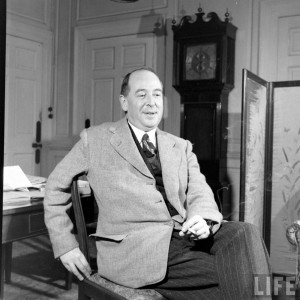 In Reflections on the Psalms, C. S. Lewis takes aim at people who jump on bandwagons for their own personal benefit. In a chapter he titled “Connivance,” he writes of those in ancient Judea “who fleeced their fellow-countrymen to get money for the occupying power in return for a fat percentage” of the take.
In Reflections on the Psalms, C. S. Lewis takes aim at people who jump on bandwagons for their own personal benefit. In a chapter he titled “Connivance,” he writes of those in ancient Judea “who fleeced their fellow-countrymen to get money for the occupying power in return for a fat percentage” of the take.
He was, frankly, astounded by the attitude he witnessed in one young man who had studied at Oxford. The man had been an avowed socialist during his student days: “Everything ought to be run by the State; private enterprise and independent professions were for him the great evil.”
A decade after graduating, he returned to speak with Lewis, who was surprised by the change in the man’s philosophy:
He said his political views had been wholly reversed. You never heard a fuller recantation. He now saw that State interference was fatal. What had converted him was his experience as a schoolmaster of the Ministry of Education—a set of ignorant meddlers armed with insufferable powers to pester, hamper and interrupt the work of real, practical teachers who knew the subjects they taught, who knew boys, parents, and all the real conditions of their work.
So what did this conversion yield? Did the young man, who had now seen the error of his ways and had witnessed the corruption of the system up close, firsthand, seek a way to change the system or to work outside of it? Wouldn’t that have been a natural response? Instead, Lewis recounts,
The real point . . . of his visit, when it came, nearly took my breath away. Thinking thus, he had come to see whether I had any influence which might help him to get a job in the Ministry of Education.
Rather than stand tall on his presumed principles and do something about this vile system, he sought instead to find a way into it. Lewis concludes,
Here is the perfect band-wagoner. Immediately on the decision “This is a revolting tyranny,” follows the question “How can I as quickly as possible cease to be one of the victims and become one of the tyrants?” . . . This is an instance of band-wagoning so crude and unabashed as to be farcical.
 What’s the lesson here? Could it be that we need to examine our own lives and see if there be any ways—more subtle than this man’s—where we compromise our principles and seek to ingratiate ourselves into a system or way of life we say we deplore? Are we being consistent with our profession of faith and with what we tell others we believe?
What’s the lesson here? Could it be that we need to examine our own lives and see if there be any ways—more subtle than this man’s—where we compromise our principles and seek to ingratiate ourselves into a system or way of life we say we deplore? Are we being consistent with our profession of faith and with what we tell others we believe?
If so, our next step should be to abandon any such bandwagon and regain our integrity.
